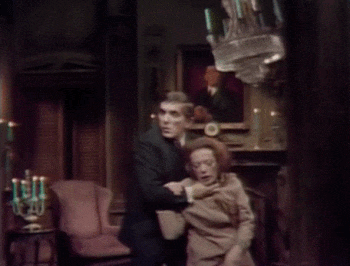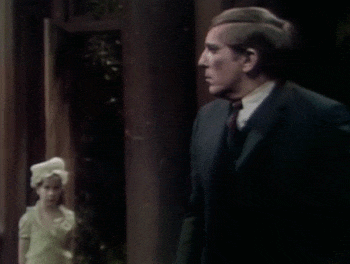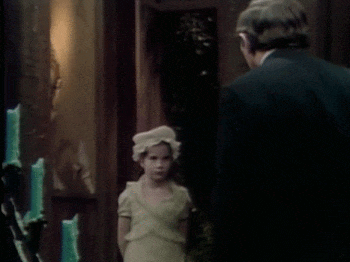By PATRICK McCRAY
Taped on this date in 1968: Episode 640
Amy speaks on the antique phone to the ghost of Quentin Collins, but he refuses to talk to David, leading the boy to start a seance. Vicki interrupts it, and Chris soon enters. Amy implores him to stay with her in Collinsport. Bolstered by Carolyn’s flirtatiousness and eagerness to host Amy, he is sorely tempted. That night, Carolyn and Chris share a drink at the Blue Whale, but the evening is cut short when Chris realizes that the sun is setting, the full moon is rising, and the waitress has the shadow of the pentagram on her forehead. Despite chaining himself to a radiator, Chris is quickly free after he transforms into a walking wolf. He sprints to the Blue Whale where he bursts in and savages the waitress.
With Adam, Nicholas, and Cassandra finally out of the way, DARK SHADOWS inaugurates its first major post-Barnabas storyline with a confidence that would read like a swagger were it not executed with such dignity. Why break with your protagonist? Whether they knew it or not, the writers were playing the long game. Yes, Barnabas attempts to help Chris and solve the Quentin issue, but his actions are fungible until happenstance channels him from the I Ching trance into his awaiting body in 1897. He’s quite literally the only man for the mission, but he’s more than up for it. Barnabas even commands his vampiric powers with an insouciantly stalwart sense of control. Yes, he realigns his moral compass thanks to his experiences with Adam and Blair, acquitting himself admirably. But he has no choice. Adam shares his soul and Nicholas is his demonic brother-in-law. In 1897, everything is a choice, and though those choices, we see the ultimate mettle of his character.
Back in late November of 1968, Barnabas is nowhere to be seen, however. Instead, there are new faces mixed with the old. Don Briscoe brings an entirely different energy to DARK SHADOWS as its temporary, resident protagonist. Few actors can vacillate as believably between desperate compassion and an electric sense of anger. Again and again, he suckers us in with kindness, turns with ferocity, and then reassures us that the anger is directed situationally, not personally. That layered nuance makes him an idea choice for a tortured lycan. Denise Nickerson’s energy and assuredness are an ideal compliment, making the brother/sister pair one of the shows most convincing, if unsung, duos. In this episode, Betsy Durkin continues to redefine and arguably elevate the character of Victoria Winters. I really hate that them’s fightin’ words. It’s a shame that she should only be aboard for the (first part of the) character’s Viking funeral. Or un-Viking, considering that she doesn’t burn.
A special triumph in this episode is the debut of their first, genuine monster, the actual, no-we’re-not-kidding werewolf. It’s an update of the Jack Pierce design, with a strangely mellowing emphasis on the nose and eyes. It’s one of the most human werewolves, despite its shock of wild hair, but it never lacks for athletic savagery. Alex Stevens, the stuntman behind the makeup, was a consummate daredevil, executing leaps and dives around the sets that are genuinely breathtaking. The very fact that there is, you know, a werewolf on the show really delivers on the promise of DARK SHADOWS’ conceit. But to see him so nimbly take potentially leg-breaking chances off railings and through windows is something truly unexpected.
November 28, 1968 saw the release of the controversially (un)covered album by John Lennon and Yoko Ono, TWO VIRGINS. It, um, was, um. You know, um. Have you ever heard Yoko?



























